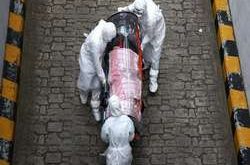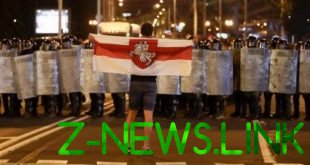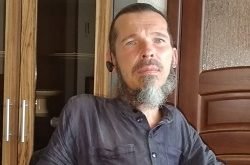
Under the heading “Antiracism” we are completing the publication of the section on “Prospects for socialist revolution,” a monograph by V. A. Sakharov. In the previous fragment, Sugars clearly showed how Lenin rethink the practice of the Russian revolution and changes in the international environment. As a result of this work was born of the Leninist theory of building socialism surrounded by capitalist countries. In the fragment published below, V. A. Sakharov shows that the creative Marxist ideas of Lenin, Trotsky, could oppose only the dogmatic legacy of the scheme. Lenin explained the party and the working class, which opened the prospects for building socialism without the support of the world revolutionary process, demand from the party workers and the use of market methods of managing. The ability to use the capitalist relations for the benefit of socialism was the success of the dictatorship of the proletariat. So it is necessary to master them, it is necessary to increase cultural and educational level of the Communists and workers. Thus, Lenin was not just formulated a new theory of building socialism, but at the same time put forward to the proletariat and the party of the immediate practical tasks that need to be solved.

Trotsky, as a theorist, had nothing to oppose Leninist analysis and remained under its scheme called “permanent revolution”. Under this scheme, the main condition for the victory of socialism remained the Western proletariat, which have their revolutions to help the Soviet Republic. Having considered the meaning of Trotskyist theory, and its disagreement with Lenin, V. A. Sakharov fine concludes: in a time when Trotsky continued to ignore the changes in the world balance of class forces and continued to insist on the dependence of the Russian proletariat from the West, Lenin saw the Russian working class and its Alliance with the Russian peasantry a new force that led the world revolutionary movement.
===
THE PROSPECTS FOR SOCIALIST REVOLUTION
The new struggle took the form of competition with the bourgeoisie in the economic field. The dictatorship of the proletariat leads her, in an effort to prove to the peasants that the Soviet government can organize economic life of the country and meet the interests and needs of the peasantry not worse, but better than the bourgeoisie. Hence the requirement to learn from the bourgeoisie capitalist methods of management, to learn to manage. Demonstrate the ability to manage should be fast, for the year to wait a long time the peasantry would not. Either the Soviet government will prove to the farmer that he can help him, “or he’ll send us to hell. It is absolutely inevitable”. Since the results of this competition with the bourgeoisie will be checked the success of the Soviet power, it is not just a contest, a “desperate, frantic, if not the last close fight on the belly-and-death struggle between capitalism and communism”, “another form of the struggle between the bourgeoisie and the proletariat.” This is understandable, because economic competition is the only way to win economic, and hence political victory over the bourgeoisie and to destroy it as a class.
Victory in this struggle for the peasantry, paralyzing at the time of his anti-socialist potential, would allow to involve on the party of the socialist revolution democratic potential of the peasant movement and thus to isolate and defeat the forces of internal counterrevolution. Lenin saw the opportunity to win this fight for the peasants and through this to realize the peaceful option for the development of the socialist revolution. Such a policy is challenging, but not hopeless, as the experience of the civil war taught the proletariat and the peasantry to be weighed and to align their interests.
Lenin believed that the Bolsheviks could endure this exam that the success of the struggle depends only on it themselves. “Political power” and “economic power” in the hands of the dictatorship of the proletariat “is quite sufficient in order to ensure the transition to communism.” Moreover, the question of the victory of the revolution, Lenin does not bind with the assessment of the degree of backwardness or development in the country. For Lenin, this question has long been resolved positively the minimum necessary conditions for that in Russia. All other victory conditions are available. World revolution as the victory or the successful solving of internal problems of the Russian socialist revolution — not a word. Furthermore, Lenin believes that the world bourgeoisie “many more will “last and decisive battles””. And he predicts a tragic outcome of these fights for the Russian socialist revolution. On the contrary, expresses confidence in the victory, therefore, Lenin positively decides the question of the victory of socialism in conditions of capitalist encirclement.
Lenin admits that during the “last and decisive battle” can be not only victory, but defeat in an open struggle, and, in addition, the possible degeneration of the revolution. The main danger to the revolution, Lenin saw not in the external conditions of its existence, and in the internal problems of its development. The new economic policy, removing or pritupov some of these dangers, exacerbated others. In Soviet historical literature there was a certain euphoria about the NEP, expressed in the emphasis on opening them to the possibilities and leaving without proper attention related difficulties. Lenin had acted differently, he pointed not only to new opportunities for the development of the socialist revolution in Russia, but danger for her, which carried with them new economic policy. Much attention he paid to this issue at the XI Congress of the RCP(b).
Lenin speaks about the threat of the degeneration of the revolution. About it (the threat of “Thermidor”) are often said Trotsky, while radically disagreeing with Lenin on the question of the possible causes of it. In full accordance with the theory of “permanent revolution” Trotsky saw as the reasons for [“Thermidor” – approx. edition Bescom] in the absence of the world proletarian revolution and, in addition, personal qualities of the leader. Lenin developed opposite views on the matter. He not only put the threat of a possible degeneration of the revolution dependent on the success or failure of the world revolution, but also, perhaps, arguing with Trotsky, said that the danger of the degeneration comes not from the personal qualities of the revolutionaries, and from the “giant mass”. This danger arises if the masses believe that the current policy does not meet their interests. The last circumstance in the conditions of the NEP is almost entirely dependent on the ability of the Bolsheviks to manage. It is clearly not enough due to lack of “cultural sensitivity to the layer of the Communists, who manages”. Lenin drew attention to the experience of history, who testified that “Thermidor” was inevitable if the level of culture of winners below, than the vanquished. For the Russian socialist revolution, it was a real threat: no matter how low was the culture of the new bourgeoisie, and the culture of the proletariat and the peasantry was much lower. Not yet learned, Communist in name only administrators will be leaders, the real power will belong to those who really know how to manage — the “special”, not separating the idea of the socialist revolution, which the Bolsheviks had to go. This problem was solved by creation of own qualified personnel. Task, though difficult but achievable. If these items evaluate the proposals of Trotsky to reorganize the system of management of the economy, you have to admit that they just carried the danger of “Thermidor”.
No at the XI Congress or later, the opponents of Lenin were not able to oppose them developed a concept of anything equivalent on the significance of the findings and their justification. Chief among them Trotsky continued to repeat its past estimates and projections. This is shown by recent mapping of Lenin and Trotsky’s views and assessments, which occurred in late 1922, Speaking at the V Congress of the Russian Communist Union of youth (11-19 October, 1922), Trotsky defined the development vision of the revolution and of the Soviet republics. He said that if capitalism is in a period of 10 years can resist the threat of revolution, it will mean that world capitalism “is strong enough to once and for all (emphasis added. — B. C.) to suppress the proletarian revolution throughout the world, of course, to crush Soviet Russia.” As can be seen, Trotsky quite clearly opposes their assessment of Lenin. Lenin holding NEP in 10-20 years opens up the possibility for transition to socialism, while Trotsky 10 years of the NEP is equivalent to death of Soviet power and the revolution. But that’s not all. According to Trotsky we get the following perspective of the world revolution: either it will start and win a decisive victory in the next 10 years, or it is removed from the agenda of history. Or all or nothing ever.
As if taking a call Trotsky and engage in debate with him, Lenin in greeting the fourth Congress of the Comintern drew a completely different perspective: “Soviet power… stronger than ever… we will Win”. Its report to Congress (November 13) he is actually devoted to the justification of this assessment. He, in particular, said: “I believe that all of us in good conscience can answer Yes to this question (about the benefits of a proper retreat. — B. C.), namely in the sense that past year and a half, positively and absolutely prove that the test broke down.” It was a kind of answer to the question about the ability of the Bolsheviks to show the peasants their ability to manage. Lenin expressed confidence that the issues at stake (the accumulation of funds, primarily) will be solved, have already begun to be addressed. “Most importantly, Lenin thought, — <…> the Peasantry satisfied with their position. We can safely say… the Peasantry is the decisive factor… we do not have to fear on his part of some movement against us. We say this with full consciousness, without exaggeration” (emphasis added. — B. C.). Highlighting the successes of the Soviet regime, achieved on the basis of the NEP, and the mistakes made by the international bourgeoisie, Lenin States that “prospects of the world revolution… favorable,” and they can again be “excellent.” Anti – Trotskyist in essence, the focus of these assessments of Lenin is obvious.
Leninist analysis of possibilities of development of the revolution in the conditions of the NEP, Trotsky at this Congress of the Comintern could oppose only General considerations which indicate that he remained faithful to their old views and was unable to conduct a reasoned debate with Lenin on the merits of the issue. They are to play them: “After the conquest of power, the task of socialist construction, especially commercial, stands as a Central and yet difficult. The resolution of this problem depends on the reasons of a different order and of different depths: first, the level of the productive forces and, in particular, the relationship between industry and peasant economy; secondly, from the cultural and organizational level of the working class winning state power; thirdly, from the political situation, international and domestic: if defeated, the bourgeoisie finally or still resists, — whether there is foreign military intervention, — sabotaging the technical intelligentsia, etc., etc
On the relative importance of these conditions of socialist construction must be located in that order in which we brought them. The primary condition is the level of productive forces; then follows the cultural level of the proletariat; and, finally, political and military-political situation, which gets the proletariat, having seized power.
But it is a logical sequence. And the working class taking power, first of all, faced with political difficulties… in the second place the proletarian vanguard is faced with difficulties arising from the failure of the cultural development of the working masses. And only in the third phase of its economic construction depends on the limits of the existing level of productive forces”. In the NEP, Trotsky saw only “a system of measures that would ensure the gradual rise of the productive forces of the country even without the assistance of a socialist Europe”, i.e. a policy, in principle, allows to accumulate “stuff” for a future socialist revolution, but no more. It is significant that in this software, by its nature, speech, Trotsky had no place to analyze the problem of participation of the peasantry in the socialist revolution. Obviously, because Trotsky had nothing to say about this, since for him the problem was reduced to the struggle with counter-revolutionary aspirations of the peasantry.
Concerned, his defeat of the revolution in Europe, created “for the Soviet Republic and its economic development in the least favourable conditions” “in the ring of economic blockades”. “The main advantages, — said Trotsky — is clearly on our side — except for one very important behind private capital, operating in Russia, is the world capital. We still live in a capitalist environment. Therefore, we can and must raise the question whether our incipient socialism, hosting more capitalist means, ruined by global capitalism?” And says: “If we admit, indeed, that capitalism will exist in Europe for another century or half a century and that Soviet Russia will have to adapt to it in their business policy, then the question is solved by itself, for this assumption we assume the collapse of the proletarian revolution in Europe and a new era of capitalist revival”* [* – to See in these conditions, accurate prediction of the fate of the Russian revolution for no reason. First, during the development of the world revolutionary process, the socialist revolution has gone far beyond the first of the Soviet republics, many countries have built a socialist society. Second, the reasons for the defeat of socialism in the USSR and other countries cannot be reduced to what Trotsky said Prim. V. A. Sakharov].
In assessing the prospects of the Russian revolution Trotsky meshed with the Mensheviks (social Democrats): if the socialist revolution in Europe will be delayed (according to Trotsky, this is unlikely, and for the social Democrats is a given), then the NEP will lead to the downfall of the socialist revolution in Russia. Both sides agree that this will happen through internal rebirth (“Thermidor”). Does not help that Trotsky have established large time — 50-100 years. A month ago, he determined the period of 10 years. “Progress” is obvious, but it is not evidence of the evolution of views of Trotsky, and disguise them odious and unpopular in the Bolshevik party of the findings, and that these forecasts are emotional and dogmatic character. Complete “hopelessness,” absolute “pessimism”, which Trotsky always tried to evade, but which was constantly shown as if independent of his will.
In this speech at the fourth Congress of the Comintern, Trotsky for the first time after 1917 he opposed the Leninist concept of socialist revolution in Russia, its system of opinions and views, however, have not worked out in detail, but perfectly formed, in its main provisions, approaches.
N. And. Vasetsky appreciates the report of Trotsky on NEP to the fourth Congress of the Comintern as “the pinnacle of his political career in the postwar period. Above, from the viewpoint of theoretical understanding of the NEP, he never got up”. I think vasetsky rights. But the estimate it is necessary to add that the speech of Trotsky was also the culmination of his disagreement with Lenin on the fundamental issues of the socialist revolution.
It is known that Trotsky later (for example, at the XV conference) objected to the opposition of his views presented at the Congress of the Comintern, Lenin. However, he referred to Lenin’s note, sent to him on 25 November 1922: “I Read Your thesis regarding the NEP and find them, in General, very good, and some formulations are extremely successful but small part of the paragraphs seemed to me controversial”. However, in the Leninsky text there is nothing that would decipher it in the spirit of Trotsky, since Lenin does not specify either of those positions, that would satisfy him, nor those who appeared to him to be controversial. But this note is an indication of the valuable aspects of these theses: “they will be good to familiarize foreign audience with our new economic policy.” That’s all. But if “good” and “useful” part of the theses of Trotsky, Lenin was reduced to propaganda, therefore, theoretical assessment and political forecasts Lenin referred to them and, obviously, reckons among the “disputed” points. Thus, this attempt of Trotsky to find in Lenin a witness of the coincidence of their views in key theoretical and political issues from satisfactory.
Trotsky spoke at the Congress on 13 November 1922 immediately for Lenin, therefore, Lenin respond to him here the Congress could not, but he used to do the first public performance — November 20, 1922 at a meeting of the Moscow Soviet, which was his last performance. V. I. Lenin said that “we had no doubt that we need… to succeed alone… We have to calculate in an environment capitalist as we its existence will provide; how we get profit from our opponents.” A chance to succeed given the competition between capitalist States, opening the possibility to maneuver between them, so the problem is that the face of the capitalist world to become “strong, independent” state. And then Lenin directly formulates perhaps his most important antiraciste thesis: “Socialism is no longer a question of the distant future… We have dragged socialism into everyday life and you’ve got to understand. That’s what is the task of our day, that is the task of our age. Let me end by expressing confidence that, as this task is neither difficult, as it may be Nova… all of us, not tomorrow but in a few years, together we will solve this challenge at any cost, so from the Russian NEP will be socialist Russia”.
So Lenin, identifying new opportunities for the Russian revolution, in 1921-1922, more left from the old assessments, demonstrating a creative approach to Marxism as a method of knowledge and guide to action. The very fact that he began to search for solutions facing the revolution new challenges and got the first positive results, Lenin took a step forward in the theory of the socialist revolution. He was moving towards the recognition of larger possibilities of development of the Russian socialist revolution in unfavorable external conditions, greater autonomy for its development by identifying additional internal resources and capabilities utilizing the intra-imperialist contradictions. Lenin substantiated the new vision of the world socialist revolution and places the Russian revolution in it: ahead of world revolution, enriching it not only new experience but also new theoretical insights.
The farther left Lenin in his views on the ways of development of the socialist revolution in Russia and more than Trotsky believed in the correctness of his theoretical scheme, the more he politically disagreed with Lenin, the more he showed his political proximity to the Russian Mensheviks and European social Democrats and dogmatic attitude towards Marxism, inability to creatively approach it.
By the end of 1922 Lenin and Trotsky came up with a clearly formulated, completely different political concepts, opposing each other in important issues of theory, strategy and tactics of the revolution.
V. A. Sakharov, “”Political Testament” of Lenin: the reality of the history and myths of policy
© 2019, paradox. All rights reserved.





